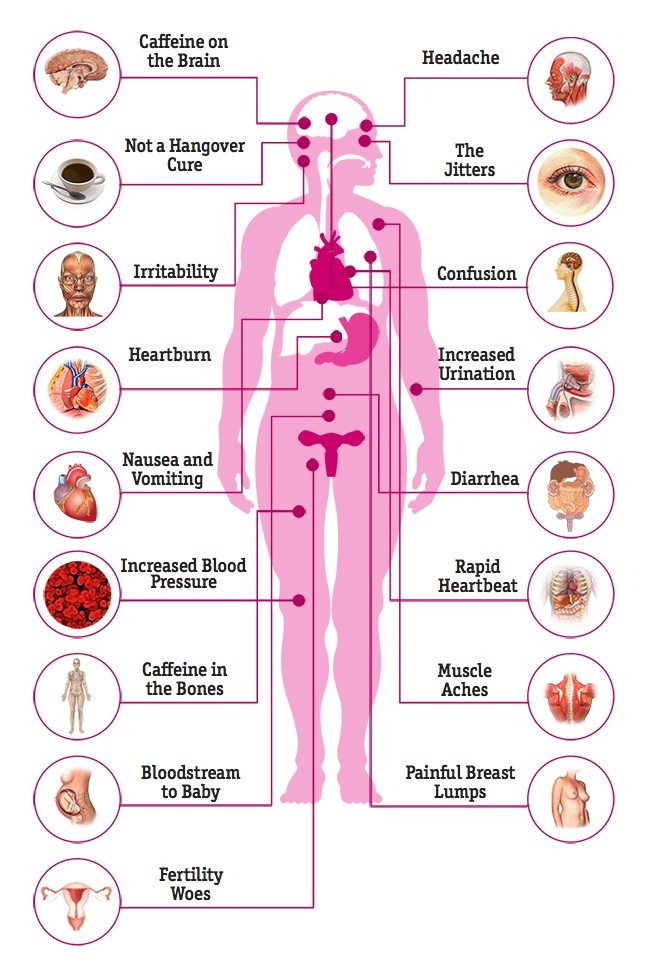Caffeine Addiction Diagnosis
Caffeine is a central nervous system stimulant. It can temporarily make you feel more awake and energetic, but it can also give you the jitters. Withdrawal or overdose can cause a range of problems

Caffeine Overdose Symptoms
Consuming too much caffeine can lead to a caffeine overdose, also known as caffeine toxicity. The symptoms of a caffeine overdose can vary in severity but may include the following:
- Restlessness: Feeling unusually jittery or anxious.
- Increased Heart Rate: Palpitations or a rapid heart rate (tachycardia).
- Nervousness: Excessive nervousness or agitation.
- Gastrointestinal Distress: Stomach upset, nausea, vomiting, or diarrhea.
- Insomnia: Difficulty falling asleep or staying asleep.
- Muscle Tremors: Shaking or trembling hands or other muscle groups.
- Headache: Intense headaches or migraines.
- Dizziness: Feeling lightheaded or dizzy.
- Flushed Skin: Skin may feel hot or appear flushed.
- Irregular Heartbeat: In some cases, caffeine overdose can lead to irregular heart rhythms (arrhythmias), which can be serious.
- Hallucinations: Severe caffeine toxicity can cause hallucinations or delusions.
- Seizures: Extremely high doses of caffeine may trigger seizures, but this is relatively rare.
- Confusion: Cognitive impairment, difficulty concentrating, or confusion.
It’s important to note that the severity of symptoms can vary depending on the individual’s sensitivity to caffeine and the amount consumed. In severe cases, caffeine overdose can be life-threatening and may require immediate medical attention. If you suspect someone is experiencing a caffeine overdose or if you are experiencing severe symptoms yourself, it is essential to seek medical help promptly.
To prevent caffeine overdose, it’s important to monitor your caffeine intake, be aware of the caffeine content in various beverages and foods, and consume caffeine in moderation. The recommended safe daily intake of caffeine varies from person to person but is generally considered to be around 400 milligrams for most adults. It’s a good idea to be mindful of your caffeine consumption and how it affects your body to avoid potential adverse effects.
The Effects of Caffeine on the Body
Caffeine is a central nervous system stimulant. It can temporarily make you feel more awake and energetic, but it can also give you the jitters. Withdrawal or overdose can cause a range of problems.
Caffeine Affects Central Nervous System

Caffeine and headaches have a complicated relationship. Too much caffeine can give you a headache. However, your body develops a tolerance to caffeine. If you normally consume caffeine and stop suddenly, it can cause a headache. Caffeine is used in some over-the-counter and prescription-strength headache and migraine remedies.
Despite the common wisdom of drinking coffee to recover from too much alcohol, caffeine doesn’t actually help your body process alcohol any faster.
If you’re not used to it, caffeine can give you the jitters. If you have an anxiety disorder or sleep disorder, caffeine may make it worse.
Symptoms of caffeine withdrawal include anxiety, irritability, and drowsiness. In some people, sudden withdrawal may cause tremors.
It’s also possible to overdose on caffeine. Symptoms of an overdose include confusion and hallucinations. An overdose can result in death due to convulsions.
Effects of Caffeine on Digestive and Excretory Systems

If you have stomach problems, like acid reflux or ulcers, ask your doctor if it’s okay to have caffeine. Large doses of caffeine cause you to lose too much water, especially when consumed in conjunction with exercise.
Withdrawal from caffeine can cause nausea and vomiting. Symptoms of caffeine overdose include diarrhea, excessive thirst, and increased urination.
Effects of Caffeine on the Circulatory and Respiratory Systems

Caffeine can make your blood pressure go up for a short time. In most people, there is no long-term effect on blood pressure. If you have irregular heart rhythms, caffeine may make your heart work harder. If you have high blood pressure (hypertension) or heart-related problems, ask your doctor if caffeine is safe for you.
An overdose of caffeine may cause rapid or irregular heartbeat and breathing trouble. In rare cases, caffeine overdose can cause death due to convulsions or irregular heartbeat.
Effects of Caffeine on the Skeletal and Muscular Systems

Symptoms of caffeine withdrawal include achy muscles. An overdose can cause muscle twitches.
Effects of Caffeine on the Reproductive System

Caffeine can also contribute to painful lumps in the breast (fibrocystic disease). According to the Mayo Clinic, there is some evidence that large amounts of caffeine can interfere with estrogen production and metabolism, making it harder to get pregnant.
If you have lumpy breasts, are pregnant, or are trying to get pregnant, ask your doctor about safe levels of caffeine.
[mlw_quizmaster quiz=1]Lighthouse Network is using this text with the permission of Caffeine Informer Staff.
www.caffeineinformer.com